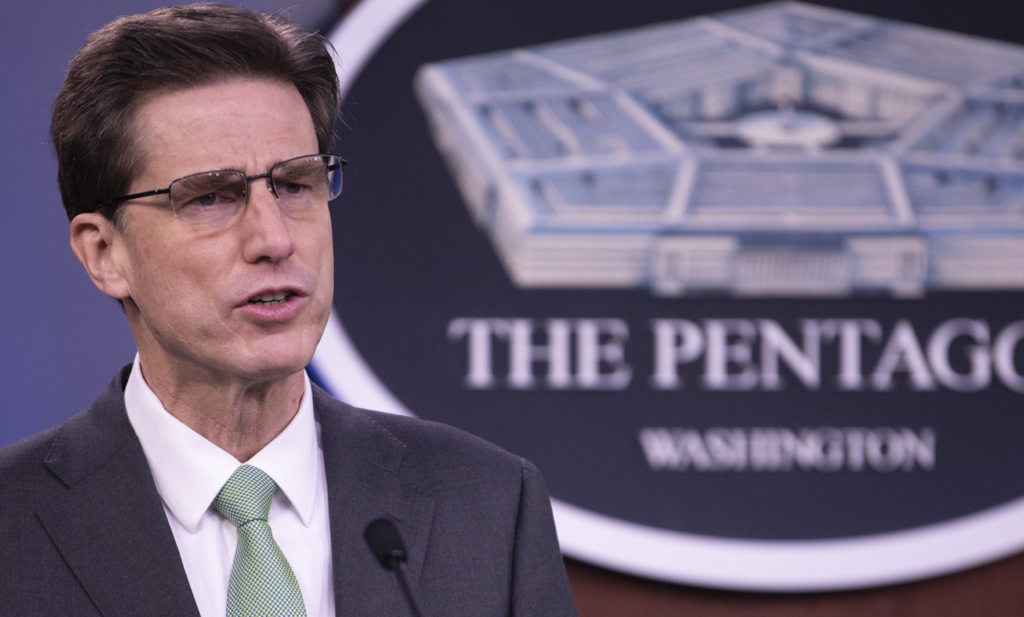
Dana Deasy
WASHINGTON: A letter from the Pentagon’s Chief Information Officer to the skeptical chairman of the Senate Finance Committee offers intriguing details and arguments about the troubled JEDI cloud computing contract, long stuck in legal limbo.
CIO Dana Deasy has been the chief public defender of the Joint Enterprise Defense Initiative, while Sen. Charles Grassley, a Republican, has been a persistent critic. In an Oct. 5 letter to the Defense Department, Grassley demanded to know how much the Pentagon has spent so far on the stalled contract and what it has done to implement the recommendations of an Inspector General report on what went wrong – particularly, any disciplinary action against DoD officials accused of conflicts of interest, notably Deap Uhbi, who went on to work at Amazon while it was making its bid.
Deasy’s response – dated Nov. 18 and subsequently published on Sen. Grassley’s website – includes a lot of the usual boilerplate and non-answers, but there are some intriguing nuggets too. “We are unable to comment on individual personnel actions,” Deasy repeats over and over, “[but] the Professional Conduct Board conducted a thorough review of the matter, as recommended [by the Inspector General]. The final decision after the review was that there was no cause to take steps in the nature of professional discipline.”
That said, Deasy flatly states that “Mr. Ubhi made a deliberate attempt to deceive DoD” about his potential conflict of interest, which is why the normal disclosure process didn’t discover it. (The Inspector General report is much blunter: It says Uhbi “lied”).
Another tantalizingly incomplete detail is Deasy’s estimate for JEDI’s cost to date. The process of administering the contract – from evaluating proposals, to picking a winner (Microsoft), to responding to the protest from the loser (Amazon), to reevaluating key parts of the proposals only to reaffirm the original winner – cost $5,337,200 from Oct. 12, 2018 through Sept. 4, 2020. But that’s only the personnel costs clearly traceable to the contract.
The $5.3 million figure doesn’t include the preliminary work to draft requirements and issue a solicitation, which Deasy says was shared among too many people, most working only-part time, for a clear estimate. Even more glaring, it doesn’t include any of the time spent by Defense Department lawyers.
Given that the court battles over JEDI started in 2019, with a lawsuit from disappointed competitor Oracle, and continue against Amazon to this day, those lawyers must have racked up a lot of hours.
So, given all this dispute and delay, is JEDI worth saving? In his letter, Grassley pointedly asked how the contract requirements written in 2018 could still be up to date, given rapid advances in cloud computing and artificial intelligence.
“Yes, all of the contracts requirements that were previously written are still up to date,” Deasy replied. Why? Because the contract is written to require “commercial parity” – that is, the winning bidder must offer the Defense Department everything it’s offering its commercial customers, at a comparable price.
“The JEDI Cloud contract requires commercial parity with the Cloud Service Provider’s (CSP’s) public offering to ensure DoD has full access to the latest innovations being offered at equivalent costs of the other services relevant to the commercial pricing,” Deasy wrote. “The JEDI Cloud contract also includes packages that are intended to provide direct customer support. These two factors will enable DoD to keep pace with commercially available cloud technologies and provide industry knowledge, best practices, and expertise.”
If that doesn’t work, Deasy added, the Pentagon can get out of the JEDI contract after spending just 0.000001 percent of its much-cited $10 billion maximum value. “The Department may choose to stop placing task orders against the contract. The [winning bidder] is guaranteed only $1.0M in task orders of the $10B contract ceiling value,” Deasy writes. “[Or] the Department may choose not to exercise follow-on contract options. Only the two-year base period is guaranteed at time of award.”
We’ll have to see whether the Pentagon uses this escape valve or finally makes the JEDI program work.
Defense Department launches Fulcrum Strategy to transform cyber and IT capabilities
“Fulcrum really represents the department’s shift towards leveraging technology and information technology as a strategic enabler,” Leslie Beavers, principal deputy CIO at the DoD said.


























